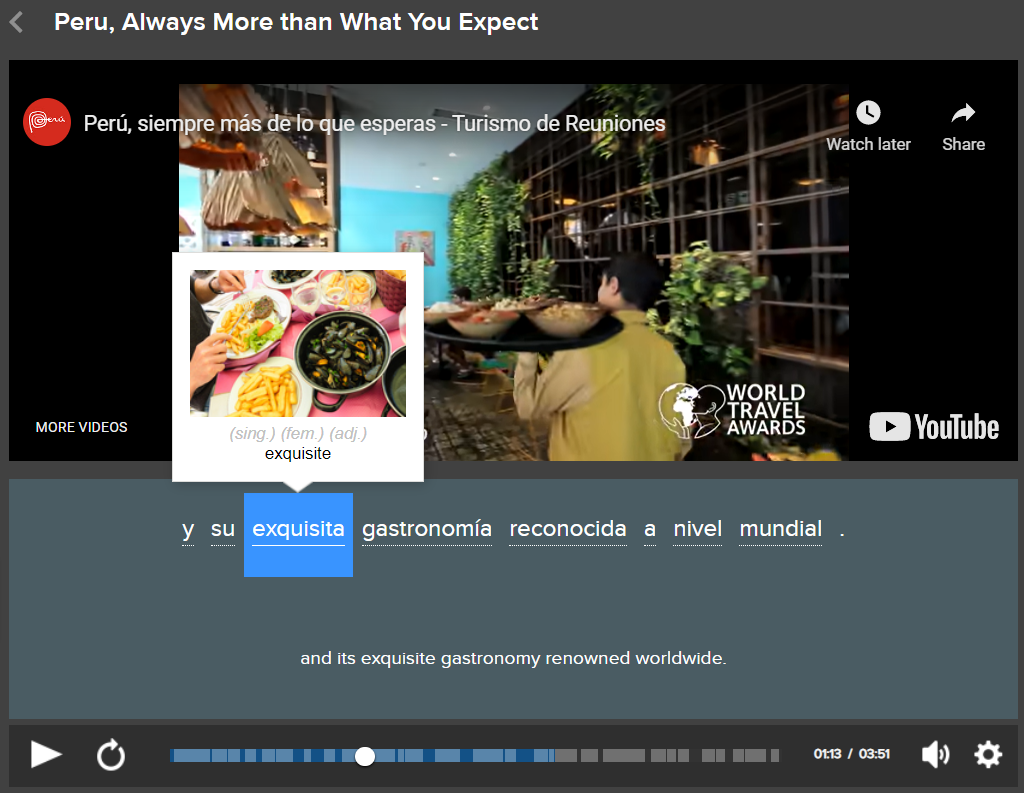
How to Learn Spanish
I learned to speak Spanish, and it took a long time and a lot of personal dedication.
The key is to throw yourself into the deep end—in my case this was deciding to live abroad in Venezuela, but there are a ton of other ways to reach fluency.
In this post I will explain exactly how to learn Spanish using the same 18 techniques I used, from listening to Spanish music to chatting to language exchange partners.
Contents
- How to Learn Spanish
-
- 1. Watch Movies and TV in Spanish
- 2. Learn from Authentic Videos with FluentU
- 3. Learn Grammar with Textbooks
- 4. Learn Vocabulary from Spanish Novels
- 5. Immerse Yourself Wherever You Are
- 6. Listen to Spanish Radio and Podcasts
- 7. Download Spanish Apps
- 8. Travel to Spanish-speaking Countries
- 9. Keep a Spanish Blog or Journal
- 10. Take Online Spanish Courses
- 11. Get a Spanish-speaking Language Partner
- 12. Get a Spanish Tutor
- 13. Read the News in Spanish
- 14. Play Spanish Learning Games
- 15. Learn with Spanish Language Music
- 16. Learn Spanish with Recipes
- 17. Practice Thinking in Spanish
- 18. Change the Language on Your Phone to Spanish
- FAQ About Learning Spanish
- And One More Thing…
Download: This blog post is available as a convenient and portable PDF that you can take anywhere. Click here to get a copy. (Download)
How to Learn Spanish
1. Watch Movies and TV in Spanish
Time investment: Low
Spanish films and TV are a great way to build your vocabulary while improving your comprehension.
If you’re a beginner, try watching Spanish movies with English subtitles. And once you’re beyond the beginner level, try watching Spanish movies with Spanish subtitles.
By reading and listening at the same time, I was really able to improve my pronunciation.
Watching films also improves your knowledge of regional accents while you sample different Spanish-speaking cultures. Thankfully, two countries with the clearest Spanish accents—Mexico and Spain—are also the most prolific producers of Spanish language films.
One of my all-time favorite Argentine movies from the ’80s is “Made in Argentina.” I love listening to the Argentine accents in this movie and watching them drink mate from their PH patios.
2. Learn from Authentic Videos with FluentU
Time investment: Medium
One of my favorite Spanish learning methods is watching videos for native speakers because this shows how the language is used in real life.
Each video comes with interactive subtitles, which let you click on words you don’t know to instantly see their definitions and add them to your personalized flashcard deck.

For me, FluentU has increased my confidence when I’m not in a Spanish-speaking country and have little opportunity to talk with native speakers.
3. Learn Grammar with Textbooks
Time investment: High
Grammar is a technical and detailed topic, so it’s a subject that a textbook can handle more thoroughly than most resources. And doing the exercises in a textbook will help you solidify the rules in your brain.
I found a really simple grammar book and CD for beginners called “Hugo Spanish in 3 Months.”
It was excellent for learning the basic tenses, prepositions and popular phrasal constructs. It also has explanations related to plurals and gender.
It’s full of short explanations and exercises and all the answers are in the back of the book.
I set aside one hour at the end of every day to go through the exercises. Whenever I came across a section that troubled me, I’d keep going back to repeat the exercises until the grammar began to sink in.
Here are some more Spanish textbook recommendations:
The 20 Best Spanish Textbooks in 2024 | FluentU Spanish Blog
The best Spanish textbooks offer clear explanations, plenty of examples and enough practice exercises for you to really solidify what you’ve learned and assess your…
4. Learn Vocabulary from Spanish Novels
Time investment: Medium
You’ll first need to study the basic core vocabulary that comes up in almost every conversation.
But once you’re past topics like colors and days of the week, you’ll start wanting to build your vocabulary to include words you could encounter in a wide variety of scenarios. And probably the best way to do that is by reading novels.
Reading at home was the single most useful activity I did early in my learning. I read anything I could get my hands on, but I loved reading novels by Paulo Coelho, translated from Portuguese to Spanish.
I’d read a chapter, underlining anything I didn’t understand.
Then, I’d look the words up in my dictionary, note down the translations and reread the chapter.
5. Immerse Yourself Wherever You Are
Time investment: Low
The most well-known immersion method is traveling to a Spanish-speaking country since it forces you to start picking up the language to survive everyday interactions.
If you can’t travel abroad, travel to places in your hometown where Spanish-speaking people hang out. Before leaving London, I used to go to a lot of salsa clubs, and I remember having a great time.
I’d also eat in Spanish restaurants, drink in Spanish cocktail bars and I even joined a Spanish conversation group at one point.
You can also transform your home into a Spanish learning hotspot!
One fun way to do this is to label your house. Just get a ton of post-it notes and stick them to as many items as possible with their names in Spanish.
6. Listen to Spanish Radio and Podcasts
Time investment: Low
Spanish radio can be a great way to make your commute go faster. And in my case, it got me hooked on some awesome Spanish-speaking musicians like Andrés Calamaro, Vicentico, Joaquín Sabina, Anita Tijoux, Calle 13 and Gustavo Cordera.
Podcasts are also a great way to practice listening to native Spanish speakers. You’ll probably want to start with podcasts targeted at Spanish language learners because they contain simple vocabulary, spoken slowly and clearly.
Once you get better at it, you can start listening to Spanish podcasts for native speakers.
In these podcasts, the vocabulary is harder and the podcast hosts talk at an average, native speed. Using this type of podcast will boost your listening comprehension skills to the stratosphere.
7. Download Spanish Apps
Time investment: Low
There are tons of great apps to learn Spanish.
For example, you may opt for the gamified app Duolingo if you want to go from complete beginner to intermediate, while other apps may be better suited for advancing your existing Spanish skills.
Here are few more you can try:
LingQ offers many features, including the ability to track how many words you’ve learned, a playlist to shuffle content, targets so you know what you’re working toward and much more.
Also, they feature vocabulary review using a Spaced Repetition System, or SRS, which means that words you’ve learned keep showing up in your lessons.
Reword allows you to create word lists, track progress and more. With over 4,500 words and phrases offered, this app will keep most of us busy for quite a while.
8. Travel to Spanish-speaking Countries
Time investment: High
After using multiple self-learning methods for several months to a year, your progress might reach a plateau.
The good news is that this means you’re ready to take the next big step: going to a Spanish-speaking country.
I spent around seven years traveling to Spanish-speaking countries before I moved to Venezuela. I got better at sharing with locals and recognizing through context what they were trying to say to me. It was always a buzz and kept me wanting to improve my language skills.
If you take this leap yourself, you’ll be shocked at how much vocabulary there’s left to learn, and at how quickly you improve. Almost every moment is an opportunity to practice comprehension and communication.
9. Keep a Spanish Blog or Journal
Time investment: Medium
Keeping a Spanish blog is something anyone can do, even a beginner.
The goal is to create a free, basic blog (like on Blogger and WordPress) and begin by adding an editor’s note explaining that you’ve set up this blog to help you improve your Spanish writing skills and to document your progress.
If you prefer writing on paper, you could start keeping a journal in Spanish.
Writing about your day or week will help you practice putting your thoughts into words, forcing you to broaden your Spanish skills to express what you need to say.
10. Take Online Spanish Courses
Time investment: High
Let’s face it: we travel with our laptops, tablets and phones at all times, meaning any online course will be at your disposal anytime, anywhere.
I enjoyed using Coffee Break Spanish and Fluencia. They both incorporate Spanish culture into their lessons, which helps spice things up.
Coffee Break Spanish has several options for Spanish courses. Their Coffee Break Academy offers courses ranging from beginner level to intermediate. There’s even a “master” course to help push you toward total fluency.
The Coffee Break Spanish Reading Club is fantastic for building vocabulary skills. This course focuses on using weekly texts to introduce cultural insights while building reading skills.
Fluencia‘s lessons use native speakers and are broken up into topics that make for an organized, efficient method for learning. Lessons include conversations as well as vocabulary and cultural segments.
11. Get a Spanish-speaking Language Partner
Time investment: Medium
A language partner will help challenge you and make your journey less solitary and more social!
If you’re not currently living abroad, you can find a partner using sites like Conversation Exchange or MyLanguageExchange.
Having a language exchange partner will help you with pronunciation, idioms and learning about Spanish culture.
It’s amazing how quickly you’ll progress when spending time with your language exchange partner. Plus, it’ll hardly feel like work.
If you’re in an area with a Spanish-speaking population, consider going local for a language partner. Join a local club—maybe dance, cooking or even a book club!—to speak face-to-face in Spanish instead of digitally.
12. Get a Spanish Tutor
Time investment: Medium
Getting a Spanish tutor is the perfect way to power up your language learning progress, especially if you’re not being exposed to Spanish regularly as I was when I was learning.
Depending on where you live, access to a native Spanish tutor, even just a short-term one, might be limited. Fortunately, there are plenty of digital tutors.
Spanish via Skype offers Spanish tutoring with fully qualified language teachers.
Their lessons come with training materials, and their scheduling is intended to be flexible so you can book a session to suit your needs.
I love that feature—who wants to be stuck to someone else’s schedule?
13. Read the News in Spanish
Time investment: Low
Newspapers and news websites are a great place to start reading Spanish, because they tend to use simple language and a fairly restricted vocabulary.
Starting the day by reading the news in Spanish is also a great way to fit in the 20-30 minutes of Spanish practice that’ll be your bread and butter as a learner.
Some good Spanish news websites include the major Spanish daily El País, CNN’s Spanish service and Madrid’s ABC newspaper.
14. Play Spanish Learning Games
Time investment: Low
Spanish learning games are an ideal addition to any language program.
Drops is a visual method that uses concise illustrations to show word and phrase meanings. You’ll see what words mean, instead of reading the translation.
One session can be done in five-minute increments. Seeing how far you can get in that time frame is a blast.
Digital Dialects has many games to choose from that cover essential topics. Numbers, colors, nouns, basic phrases, food and so much more are up for grabs here.
The games in Digital Dialects vary by topic, and there are options for additional games within each topic. So once you finish the first games, you can play more challenging games.
It’s a smooth way to transition from basic Spanish to more intermediate learning materials.
15. Learn with Spanish Language Music
Time investment: Low
One of the easiest methods for learning Spanish is by listening to Spanish songs repeatedly to the point that the words are stuck in your head.
Through music, you’ll refine your pronunciation and accent and learn new expressions, slang and grammar structures.
Spanish music is enormously diverse, so there’s something to suit all musical tastes!
Bands like Maná and singers like Juanes were great when I started learning. They never sang too fast and were clear in their pronunciation, so it was pretty easy for me to learn the lyrics. Plus, their songs are super catchy!
Start by listening to some Spanish songs on YouTube. Once you find one you like, find the lyrics online, print them and try to sing along.
16. Learn Spanish with Recipes
Time investment: Medium
Food has always been a great entryway into new cultures. Eating the national dishes gives you a taste of history, social customs and the language itself.
At first, you can try making dishes you’ve made in the past, but in Spanish instead of English.
Once I felt pretty comfortable with the kitchen and cooking lingo, I moved onto completely new recipes in:
- “Cocina en casa con Martín Berasategui: 1100 recetas básicas” (Cooking at home with Martín Berasategui: 1100 basic recipes) and
- “De Tapas con Quique Dacosta“ (Tapas with Quique Dacosta).
These were ideal for me because the recipes require less than 10 ingredients and have very few instructions.
Generally, cookbooks are very accessible for beginners, since instructions are all in the infinitive. So go for whichever book piques your interest.
17. Practice Thinking in Spanish
Time investment: Low
Thinking in Spanish is an excellent way to practice language while carrying out your everyday activities.
Whether you’re mentally making a grocery shopping list or thinking about what to wear to work tomorrow, try using Spanish.
Try mentally translating everything you read into Spanish, whether a social media post or a restaurant menu. Once you build this habit, your mind will improve at forming Spanish sentences on the fly.
You can also talk to yourself in Spanish (though perhaps not when others are around). Speaking practice can boost your confidence for future conversations with native speakers.
18. Change the Language on Your Phone to Spanish
Time investment: Low
If you’re a newbie in Spanish, this might be a struggle.
Ideally, you would wait until you have a basic grasp of Spanish. But if you know where everything is on your phone anyway, give it a shot (you can always switch back if it’s too much for you).
Once you’ve adjusted to the switch, the next step would be changing the language settings on the rest of your devices.
Changing the default settings on your phone, laptop or game console to Spanish is a great way to incorporate a range of everyday vocabulary into your day.
Meanwhile, the necessity of interacting with a program or, better yet, a video game in Spanish will give you a sense of what it’s like to live in a Spanish-speaking country.
FAQ About Learning Spanish
What Is the Best Way to Learn Spanish?
The two best ways to maintain your Spanish learning journey long-term are immersion and consistency.
By learning Spanish you’re welcoming a lifestyle change, meaning you should surround yourself with all things Spanish! This can be done by moving to a Spanish-speaking country or following the tips I’ve outlined above.
Consistency is also a big factor: Nothing will stick in the long run if you don’t practice regularly. Doing a little bit daily is way more effective than having an extremely long review session every weekend.
How Can I Teach Myself Spanish?
Teaching yourself Spanish is more than possible with today’s technology.
In fact, learning Spanish on your own can help you become fluent faster, because you’re going at your own pace with resources that work for you.
First, you must get clear on how much time you can spend studying Spanish every day. Then, you need to gather your resources. After all that, you can start making a study plan.
You can start learning Spanish with the 18 tips we’ve discussed. But to explore more resources and tips, check out our in-depth post about self-studying Spanish here.
Is Spanish Easy to Learn?
Yes, Spanish is relatively easy for English speakers to learn.
However, the difficulty of any language depends on your past experience learning languages, exposure to Spanish, the amount of time you can dedicate, your native language and various other factors.
The United States’ Foreign Service Institute (FSI) estimates that it takes approximately 600-750 class hours to learn Spanish, which is 24-30 weeks.
It’s also ranked as a Category I language, meaning it’s described as a “language similar to English,” making it one of the easiest languages to learn.
What Is the Fastest Way to Learn Spanish?
If you want to learn Spanish fast, you need a combination of two things: active study and immersion.
This could mean using a textbook for grammar and vocabulary while watching 30 minutes of a Spanish TV show before bed every night.
It works because you’re enjoying the learning process and building a habit. You can build on this by using flashcards with spaced repetition, which help you remember new vocabulary efficiently.
So there you have it, my plan for learning Spanish.
Follow these tips, and there will come a day when someone compliments your Spanish and inquires how you learned the language so well.
Download: This blog post is available as a convenient and portable PDF that you can take anywhere. Click here to get a copy. (Download)
And One More Thing…
If you've made it this far that means you probably enjoy learning Spanish with engaging material and will then love FluentU.
Other sites use scripted content. FluentU uses a natural approach that helps you ease into the Spanish language and culture over time. You’ll learn Spanish as it’s actually spoken by real people.
FluentU has a wide variety of videos, as you can see here:

FluentU brings native videos within reach with interactive transcripts. You can tap on any word to look it up instantly. Every definition has examples that have been written to help you understand how the word is used. If you see an interesting word you don’t know, you can add it to a vocab list.

Review a complete interactive transcript under the Dialogue tab, and find words and phrases listed under Vocab.

Learn all the vocabulary in any video with FluentU’s robust learning engine. Swipe left or right to see more examples of the word you’re on.

The best part is that FluentU keeps track of the vocabulary that you’re learning, and gives you extra practice with difficult words. It'll even remind you when it’s time to review what you’ve learned. Every learner has a truly personalized experience, even if they’re learning with the same video.
Start using the FluentU website on your computer or tablet or, better yet, download the FluentU app from the iTunes or Google Play store. All annual subscriptions now on sale!












